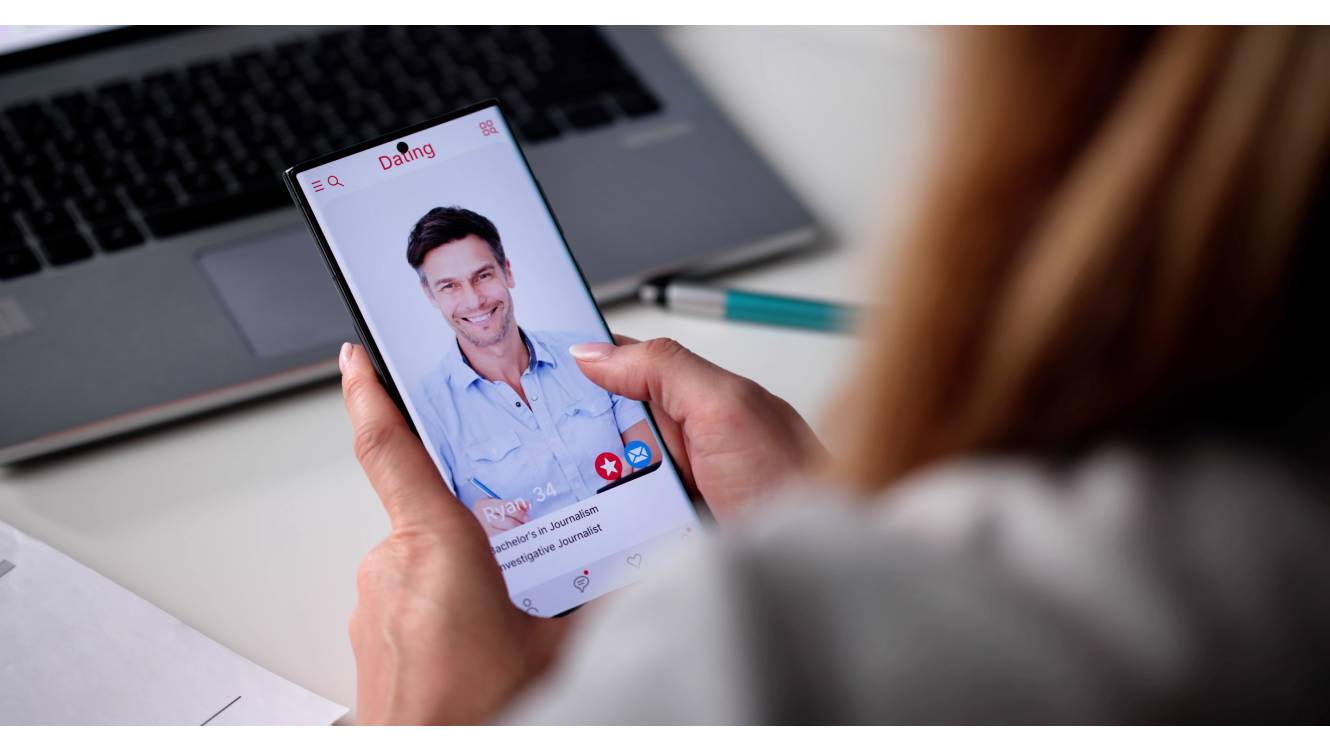

Scammers can be so convincing that their victims can refuse to believe they’ve been conned. Read these frightening real stories of fraudsters who gained their victim’s trust – and learn which common lies to look out for.

This article is for general guidance only and is not financial or professional advice. Any links are for your own information, and do not constitute any form of recommendation by Saga. You should not solely rely on this information to make any decisions, and consider seeking independent professional advice. All figures and information in this article are correct at the time of publishing, but laws, entitlements, tax treatments and allowances may change in the future.
New data has revealed a surge in romance scams targeting people over 55, and just how convincing they can be. One customer even tried to bet a bank employee £20,000 that the woman who was scamming him was real, and insisted that he wanted to proceed with the £10,000 transfer to her.
In this article, we’ll explore the latest warning signs, hear from those who have been targeted, and share what you should do to stay safe.
According to a new report by Lloyds Bank, romance scams reported by its customers aged over 55 have risen by 52% in the past 12 months compared to the previous year. While those aged 55 to 64 are the most targeted group, the average amount lost is highest among victims aged 75 to 84, who lost £8,068 on average.
Across all age groups, the typical loss was £5,219. These figures represent more than just financial loss – they can have long-lasting psychological effects when someone feels their trust has been exploited for criminal gain.
These fraudsters are patient and convincing, building a relationship based on false pretences to gain trust before asking for money. Scammers aim to isolate their victims from friends and family, making them feel the online relationship is the only one they can rely on.
The level of manipulation involved can make it very difficult for someone to accept they are being deceived. Lloyds Bank shared a real-life transcript of a conversation between one of its employees and a customer who was attempting to transfer £10,000 to a scammer.
When the employee carefully explained the situation, the customer’s response showed how invested he had become. “Are you willing to put £20,000 as a bet that it’s not genuine?” he challenged, later adding, “Honestly, I’m 100% certain this is genuine.
She was working out on an oil ship out of America.” The bank employee recognised the ‘oil rig’ story as a common excuse that scammers use to explain why they cannot make video calls or meet in person. This exchange reveals the psychological hold that fraudsters can gain.
This is a real transcript between a customer who was attempting to transfer £10,000 to someone he had been talking to online, and a Lloyds employee. Some details have been omitted for clarity and to protect their identity.
Lloyds employee: It’s not going to be easy to hear this, and I do apologise, but this is not genuine. The person that you’ve been speaking to, it's a scam.
Customer: Are you willing to put £20,000 as a bet that it’s not genuine?
Lloyds employee: Yes, I would.
Customer: Right okay, well I’ll take your full details then. Then when I prove this is genuine, I can expect £20,000 from you, okay.
[…]
Customer: Yeah, the police were involved and everything. They even told me that she never existed. But she does. So, I’ll have great pleasure of walking into Lloyds Bank and introducing her to the manager next week.
Lloyds employee: Yeah, I mean, I’ll be honest, I would agree with the manager. And I'm not trying to be difficult, I'm not trying to be rude. I'm only just trying to warn you of the risks involved.
Customer: Honestly, I’m 100% certain this is genuine. She was working out on an oil ship out of America. She’s a chef and she just flown from the ship to Texas and flown from Texas to Paris, where she went to check on her shop and the house that she owns over in in France as well.
Lloyds employee: So, I’ve heard that they work on an oil rig, that they work in a hospital, it’s all the same kind of story. The oil rig excuse is quite common and that gives them the opportunity to tell you that they can’t contact you or they can't, you know, FaceTime or anything like that because they are on an oil rig.
It’s tricky. It’s not like you know she's at home and she’d be able to phone you or visit you. There are all these excuses that keep on coming up as to why they can't call or why they can't, you know, come visit you. £10,000 is a lot of money and that would be gone if I put this through, which I'm telling you now, I'm not going to be putting that through because I believe 100%...
Customer: Please put it through, I will take all responsibility for it.
Lloyds employee: We can't do that because that money’s gone. You’d lose it immediately. Well, once you're down there [in the branch]
Customer: Well, I’ll show them my driving licence and that is it. I won’t answer any questions, and I will just tell them I want this payment to go through and that is it. Then I’ll just walk out the bank.
Another victim is Kathy (not her real name), aged 80. Kathy started talking to someone who called themselves Freddie through a word game on Facebook. After chatting online, they then began to speak on the phone and eventually this developed into a relationship. Freddie told Kathy his son was working on an oil rig near Germany and that he was travelling soon to England.
Freddie then told Kathy his son had died in a car accident, and that Freddie was going to work on the oil rig to finish the job in place of his son. He mentioned to Kathy that his card was blocked.
He later told Kathy that he’d finished the job on the oil rig, and he’d been arrested travelling back, because machinery he had with him was worth £300,000 and he had to pay £30,000 in tax for this machinery.
He asked Kathy to help with this payment, telling her he could get nearly £20,000 himself by selling jewellery but he would need help with the rest. Kathy agreed to send £11,000 to Freddie and was told to send to a policeman’s bank account as his own account had been closed by police.
When Freddie said he couldn’t get the money from the policeman, Kathy spoke to the bank, only to discover she’d been a victim of a scam.
Keith (not his real name), aged 86, met someone calling themselves Stephanie on a singles website. Over the course of a few months, they began chatting regularly, but only through text message as Stephanie said she had a bad line for calls and video calls.
Stephanie provided Keith photos of herself. Within a few weeks of chatting, Stephanie asked for help with money. She told Keith she was travelling to Australia with her daughter to retrieve some gold she had inherited.
She asked for money to help them retrieve it, telling Keith he would be reimbursed with some gold. She also sent documents relating to the gold. Keith arranged to meet Stephanie and sent her money to cover travel expenses for her to visit him, but she failed to show up.
Keith ended contact with Stephanie, realising he had been scammed. Keith’s total loss was £2,260.

Fraudsters often use a set of convincing lies to build a believable backstory.
Lloyds says it identified the most common occupations and excuses they use based on reports from its customers:
Once trust is established, the requests for money begin. The most common reasons given include paying for urgent medical treatment, covering travel expenses for a visit, or settling unexpected legal or business fees.
Fraudsters thrive on making their target feel special, often exploiting a period of loneliness or a recent life change such as retirement or bereavement. Being aware of their tactics is the best defence.
Detective Superintendent Oliver Little, from the City of London Police, said: “Romance fraudsters are highly manipulative and often operate with chilling precision – coercing victims through emotional control, false urgency, and elaborate lies. If you’ve met someone online, stay within the app’s messaging platform, be wary of requests for money, and speak to friends or family before making decisions.”
Liz Ziegler, fraud prevention director at Lloyds, offered a clear warning. “Never in any circumstances, send money to someone you’ve met online,” she said. “No good relationship starts off in this way, and there aren’t many valid reasons in 2025 why someone can’t speak to you on the phone.”
A simple way to check if a profile is genuine is to do a reverse image search of their photos. You can do this for free using search engines like Google or TinEye. Save their profile picture and upload it to the search tool. If the image appears on other websites under a different name, or on stock photo sites, it is almost certainly a fake profile.
Realising you might be the victim of a scam can feel devastating, but it’s important to act quickly and not to feel ashamed or embarrassed. These criminals are convincing and target people from all walks of life.
If you are in doubt about someone you have met online, always talk to a trusted friend or family member. They can offer an objective perspective and provide the support you need.




